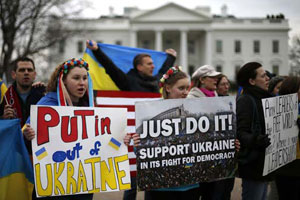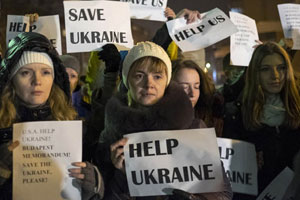WASHINGTON -- The US-Russia relationship became strained as the White House scrambled Monday to come up with economic and military sanctions on Moscow to respond Russia's reported use of military forces in south Ukraine's Crimea region.
Washington says it is suspending bilateral trade and investment engagement as well as all military engagements with Russia over the crisis in Ukraine, including halting military exercises and port visits.
Before that, the US-led Western nations had already suspended preparations for the June G8 summit due to be held in the Russian city of Sochi, which just hosted the Winter Olympics. More US actions are expected if the Ukraine crisis worsens.
Russian President Vladimir Putin defended his actions over the weekend in a phone call with his US counterpart, Barack Obama, saying Moscow has the right to protect ethnic Russians within Ukraine, who he said are under dire threat. The White House urged the Kremlin to stand down.
While US-Russia relations have obviously taken a turn for the worse, the question is how badly, and can they recover?
"We're now seeing the Russian re-set policy going down in flames," Nile Gardiner, director of the Margaret Thatcher Center for Freedom at The Heritage Foundation, told Xinhua. He was referring to the policy of renewed ties and cooperation between the two nations put in place when Obama took office.
Others, however, took a wait-and-see stance. Michael O'Hanlon, senior fellow at the Washington-based think tank Brookings Institution, told Xinhua that relations between the two countries should be viewed more as a mixed bag.
"The main thing we need to keep in mind is even if we don't like what Putin's done so far, it is potentially recoverable," he said.
Meanwhile, the Obama administration is weighing options to stop what it regards as "Russian aggression." Some options include bank sanctions, asset freezing and bans on travel visas, although details remain unknown.
But some experts believe the ball is actually in Russia's court, as the country's vast oil wealth will make it difficult to use short-term levers to squeeze the Kremlin. Moreover, Russia also supplies a large amount of Europe's natural gas.
Experts said a US-led NATO strike against Russia is unlikely, as over a decade of conflicts in the Middle East have left Americans war weary and contributed to mounting US debt.
They said the United States and its allies will use diplomatic solutions in a bid to de-escalate the situation in Crimea and steer Russia away from driving further into Ukraine.
|
 |
 |
| Phone call puts Obama, Putin in confrontation | Ukraine mobilizes after Putin's move |